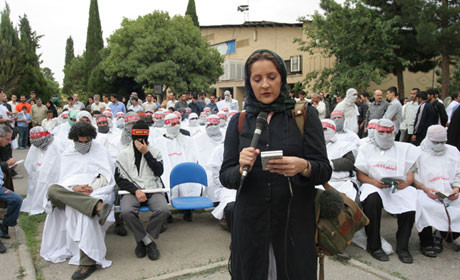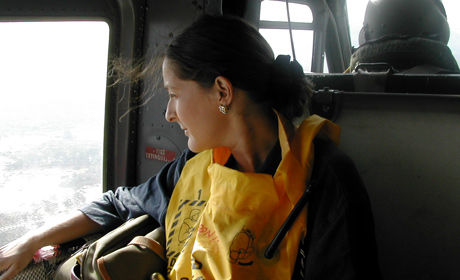
Frances Harrison reporting from Tehran cemetery at a meeting of 'suicide bombers' who planned to target US, Israeli and UK interests
Two months after giving birth, I was off to a new assignment as the BBC correspondent in Sri Lanka, a country wracked by civil war. I remember packing my suitcase, placing tiny baby clothes, milk bottles and nappies on top of armour-plated flak jackets, stab vests, helmets and battlefield first-aid kits.
Sri Lanka is where Marie Colvin, whom we mourn today, lost an eye bravely telling the story of civilians battered by war. When I arrived a Tamil stringer for the BBC in the north of Sri Lanka had just been murdered at night at home in front of his wife and children in an area controlled by government troops. The Tamil Tiger insurgency was at its height and suicide bombings in the capital were almost a routine occurrence. Mysterious murders and disappearances were rife.
Convinced I would never get another foreign posting after having a child, I hid my pregnancy from my managers, wearing loose jackets to hide the bump. I was careful not to inhale too much mace or tear gas while covering street protests. It helped that I was based in Malaysia, out of sight.
When I came back to London to give birth the BBC telephoned to offer me work as a roaming reporter. No longer allowed to fly on a plane, I finally had to own up that I was eight months pregnant.
Later I realised my instinct to hide the pregnancy came from my mother. She qualified as a lawyer in the late seventies and for the first few months didn't tell her male colleagues she had children. At lunchtime she would secretly go out of the office to a telephone box around the corner in order to call us.
Inevitably my child was born while my journalist husband was on a reporting trip. I remember the BBC's Lyse Doucet coming to visit the newborn and asking whether it was harder to be a foreign correspondent or a mother. More than a decade later I know it's hard to be both at the same time.I remember the BBC's Lyse Doucet coming to visit the newborn and asking whether it was harder to be a foreign correspondent or a mother. More than a decade later I know it's hard to be both at the same timeFrances Harrison
A few weeks after giving birth I was sent on the "hostile environment" course and had a great excuse for not doing the fireman's lifts – my bones hadn't yet slotted back into place after childbirth.
I flew to Sri Lanka for a handover, discussing press cards and death threats and, for the first time in my life, attending embassy coffee mornings to ask ladies wearing matching handbags and shoes how to find a nanny.
My husband and I resolved never to fly on the same flight to the war zone in case it was shot down and there was nobody left to look after our son. We never left the baby in the care of the nanny alone overnight. The BBC sent security expert to fit bomb film to all the windows of our house in case someone lobbed a grenade over the wall. They installed security cameras and high fences to make extra sure.
Leaving TV Centre in London I heard that female colleagues had muttered about how I was going to manage. The main problem was having to travel at short notice. After 9/11 when my husband had been dispatched to Afghanistan, the BBC decided I should go to Delhi immediately. I had no choice but to take my child too. I was saved by a colleague's wife, who looked after my Sri Lankan nanny and baby, and invited them to the playgroup/coffee mornings organised by the families of foreign journalists who'd all gone off to Afghanistan. I had a dual perspective. I could relate to the wives' frustration at being left behind with the children in a foreign country but also understood their husbands' excitement at being sent off on a good trip.

As it turned out we spent two months camping in a hotel. At one point my husband had to fly in from Iran to babysit as I went off to Kashmir – and it was good he did because that was the weekend the child got ill. By the end my toddler got so used to room service that if he was hungry he just pointed to the telephone. A decade later he still yearns for room service.
On another trip to Pakistan I stayed in a communal house for BBC staff. A female producer staying there went around telling everyone it was ridiculous that I'd brought my baby and nanny – again I had no choice as my husband was abroad. Female colleagues trying hard to be one of the lads seemed to find a child more outlandish than the Taliban. I was rescued this time by a Pakistani colleague and his wife who decided I'd better stay with them to avoid the backbiting.
In Iran, my next posting, it was routine to be reading a goodnight story to my son, only to have to rush off to the office and go live on TV. There were so many cancelled family outings and holidays cut short because of the BBC that the intake desk in London used to joke that when my son grew up he'd probably take revenge by burning down Bush House. There were some amusing moments like when I covered a conference of holocaust deniers in Tehran and my son went to school and cheerfully informed his teacher, "Mummy has gone to the holocaust".My husband and I resolved never to fly on the same flight to the war zone in case it was shot down and there was nobody left to look after our son
The Iranian authorities seemed to know childcare was my achilles heel, as with every working woman. I had failed to find any Iranian who would work the hours I did so eventually I brought our Sri Lankan nanny to Tehran, flying her home three times a year to keep her sane. After Ahmedinejad came to power the Iranian immigration department abruptly decided not to renew her work permit. She was given a week to leave. The Iranian government said it would provide us a nanny to live with us – or rather to spy on us. Paranoid, I was sure it was a soft way of kicking me out – less glamorous than being expelled. I made a huge fuss, appealing to every official – all of them male – and somehow I got away with it.
Women should be foreign correspondents but not at the price of giving up having a family. It's not just about equal rights or being representative of the population. Female journalists get access to stories men cannot do, such as sexual abuse. They are often better listeners. Women in repressive countries often tell you things more honestly because they're anonymous, all covered up in Islamic clothing. All female spaces, like swimming pools, were a great place to do vox pops in Iran. In conflicts women reporters are often perceived as less threatening – underestimated so that all sorts of confidences slip out because officials are less on their guard. Women reporters tend to be less excited with new weapons of war – the human story appeals more.
In some countries you need to be a women to understand the oppression; being a female bureau chief in Iran was like being a black reporter in apartheid South Africa. No man could know the daily humiliations of being a woman in the Islamic Republic; you had to live it.I could relate to the wives' frustration at being left behind with the children in a foreign country but also understood their husbands' excitement at being sent off on a good trip
In London being a foreign correspondent and a mother is a very rare phenomenon. When Alex Crawford of Sky News recently scooped her male colleagues in Libya I was delighted to discover she has four children.
And yet in the countries where I worked in Asia and the Middle East, a woman who doesn't have children was the odd one out. Single women were often viewed with suspicion. Politicians and officials who regarded me as an alien strident female mellowed somewhat when they realised I had a husband and child; I became a lot more "normal" in their eyes. Being a parent also gives an important perspective on reporting wars; you really understand how much love and care goes into bringing up a child.
The recruitment system for foreign correspondents does not make it easy for families, especially couples with two careers. It's no surprise that Alex Crawford has a husband whose career currently takes second place. The first time I was offered a foreign posting in 1996, the BBC initially refused to give my husband, who was working for the corporation at the time, a leave of absence to accompany me.
Flexible working arrangements and job shares would help, as well as planning deployments further in advance to fit in with schooling. The BBC's habit of requiring correspondents to return to London after each foreign posting doesn't work for families.
There are more women mangers now but very few have done time in the field and had a family. There needs to be more thought about the career path for returning correspondents whose experience and sacrifices are not valued when they come home. It seems men and women who spend years safely sitting at their desks choosing managerial paths have far better career prospects. There's still an attitude that you can't have it all – the thrill of foreign reporting and being a mum and having a full career.
Frances Harrison was BBC correspondent in Bangladesh, Malaysia, Sri Lanka and Iran and is the author of "Still Counting the Dead" - a book of survivors' stories from the end of Sri Lanka's civil war to be published this summer by Portobello Books.
Harrison has written a section for the International News Safety Institute new publication "No Woman's Land: On the Frontlines with Female Reporters", which is being launched tonight (8 March).
Free daily newsletter
If you like our news and feature articles, you can sign up to receive our free daily (Mon-Fri) email newsletter (mobile friendly).









